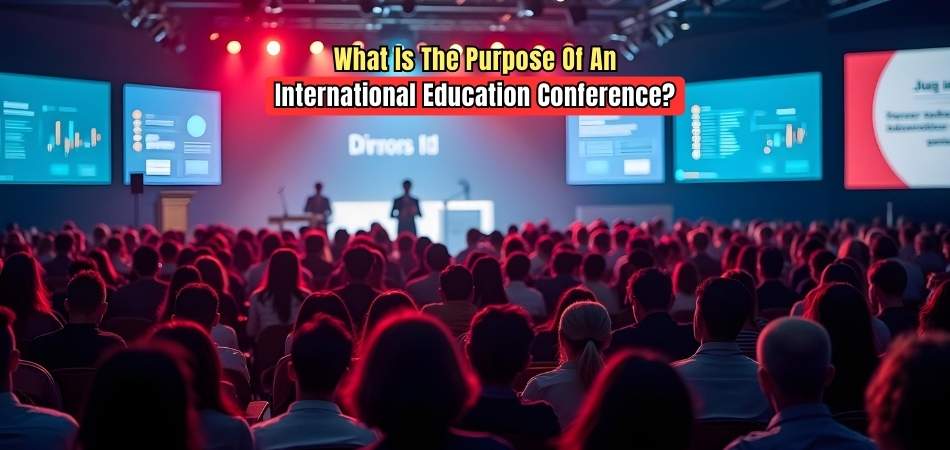International education conferences are vital events that gather educators, researchers, and policymakers to discuss key issues in the field. These conferences facilitate dialogue and collaboration among diverse participants, creating a rich environment for sharing ideas and experiences. You might be wondering, “What is the purpose of an international education conference?”
The primary purpose of an international education conference is to facilitate collaboration and knowledge sharing. These events aim to address current challenges in education while exploring innovative solutions and best practices. Participants engage in discussions about critical topics such as equity, technology, and curriculum development, ultimately seeking to enhance educational outcomes for all learners.
Are you curious about the specific goals and significance of these conferences? This article will explore the topic, providing you with essential information about the purpose of an international education conference and how it shapes the educational landscape.
Why International Education Conferences Matter in Today’s Educational Industry?
International education conferences play a crucial role in shaping modern education. They bring together educators, researchers, and policymakers from around the globe to share insights and experiences. These events foster collaboration, allowing participants to discuss the challenges and innovations in education today.
In an increasingly interconnected world, the need for diverse perspectives is greater than ever. Conferences address pressing issues such as equity, technology integration, and curriculum development. By creating a platform for dialogue, these gatherings help drive change and improve educational practices. They enable attendees to stay informed about the latest trends and research, ensuring that they can adapt to the changing educational industry.
As educators seek opportunities for growth, they often look for upcoming international education conferences that align with their interests. Attending these events not only refines individual practices but also contributes to the collective advancement of education. In this way, international education conferences are essential for creating a vibrant and effective educational community.
What Is the Purpose of an International Education Conference?
The purpose of an international education conference is multifaceted. These gatherings serve as a hub for educators and stakeholders to share knowledge, discuss challenges, and explore innovative solutions in the education sector. Below are several key purposes of these conferences.
Promoting Collaboration
One of the primary purposes of international education conferences is to promote collaboration among educators, researchers, and policymakers. These events provide opportunities for attendees to meet and share ideas, making a sense of community within the educational field. By connecting individuals from various backgrounds, conferences encourage partnerships that can lead to collaborative projects, research initiatives, and shared resources.
Addressing Current Issues
International education conferences often focus on pressing issues affecting education today. These may include topics such as equity in education, access to quality learning resources, and the integration of technology in classrooms. By discussing these challenges, attendees can gain insights into different perspectives and identify potential solutions that can be implemented in their own contexts.
Sharing Best Practices
Another significant purpose of these conferences is to share best practices in teaching and learning. Educators have the chance to present their successful strategies and experiences, providing valuable lessons for others. This exchange of knowledge allows participants to learn from real-world examples and adapt effective practices to their own institutions.
Professional Development
International education conferences serve as an important venue for professional development. They offer workshops, presentations, and keynote speeches led by experts in the field. Participants can acquire new skills, stay informed about the latest trends, and explore innovative teaching methodologies. This focus on continuous learning is vital for educators seeking to improve their practice and establish their effectiveness.
Networking Opportunities
Networking is a crucial aspect of international education conferences. These events bring together a diverse group of individuals passionate about education. Attendees can meet colleagues, establish new connections, and exchange contact information. Building a professional network can lead to future collaborations, mentorship opportunities, and enhanced career prospects.
Advocating for Educational Change
Conferences often serve as a platform for advocating for policy changes in education. Educators and policymakers can discuss existing challenges and propose innovative solutions to improve the educational landscape. By uniting voices from various sectors, conferences can amplify calls for change and influence educational policies at local, national, and international levels.
Exploring Future Trends
Finally, international education conferences provide a space to explore future trends in education. Participants can engage in discussions about emerging technologies, pedagogical shifts, and changing educational needs. This forward-thinking approach helps educators prepare for the future and adapt their practices accordingly.
Who Attends International Education Conferences?
International education conferences attract a diverse range of attendees from various sectors within the education field. Understanding who participates can provide insight into the richness of discussions and collaborations that occur during these events. Below are the primary groups of attendees you can expect to see at international education conferences:
Educators
Teachers and professors from various educational levels are key participants in these conferences. They attend to learn about new teaching strategies, share their experiences, and gain insights from their peers. This exchange of ideas can lead to improved teaching practices and enhanced student engagement.
Administrators
School and university administrators, including principals and deans, play a significant role in shaping educational policies and practices. Their participation allows them to gain valuable knowledge about trends in education and best practices for managing institutions. This insight helps them implement innovative approaches that promote a positive educational environment.
Researchers
Researchers in the field of education are essential attendees at these conferences. They present their findings, engage in discussions, and receive feedback on their work. This interaction can lead to collaborations that advance research and improve educational outcomes.
Policymakers
Policymakers at local, regional, or national levels also benefit from these conferences. They gain insights into current educational challenges and potential solutions that can inform policy decisions. Engaging with educators and researchers helps them understand the needs of the education sector.
Students
Students, especially those studying education or related fields, are encouraged to attend. Participating in these conferences allows them to connect with professionals and gain a broader perspective on their future careers. They can attend workshops and presentations that enrich their learning and career aspirations.
What Topics Are Typically Discussed at These Conferences?
International education conferences cover a wide range of topics essential for improving global education standards. These events often explore key areas such as curriculum development, the integration of technology in education, and the challenges facing global education systems. Discussions typically focus on innovative teaching methods, educational policy reforms, and the evolving needs of learners, all aimed at shaping the future of education worldwide.
Best Practices for Curriculum Development
Curriculum development is a fundamental focus at international education conferences. Educators come together to share effective strategies for designing and implementing curricula that meet the diverse needs of students. Discussions often include aligning curriculum with both local and international standards, and ensuring that all learners have access to high-quality education.
Current Trends in Educational Technology
Technology plays a vital role in modern education. Conferences often explore the latest trends in educational technology, including tools like artificial intelligence and online learning platforms. Educators learn how to integrate these technologies into their teaching to increase student engagement. Additionally, they explore how these tools can personalize learning experiences, serving the needs of individual students.
Global Education Trends and Challenges
International education conferences provide a platform for addressing global trends and challenges in education. Issues such as access to education, equity, and sustainability are frequently discussed. Educators share their experiences and strategies for overcoming obstacles faced in their regions, developing a spirit of collaboration.
Networking and Collaboration Opportunities
Networking is an essential aspect of international education conferences. Attendees have the chance to connect with educators, researchers, and industry leaders from around the world. These connections can lead to valuable collaborations, resource sharing, and professional development opportunities. Building a supportive community is crucial for addressing challenges and driving positive change in education.
Professional Development and Lifelong Learning
Another significant topic at these conferences is the emphasis on professional development and lifelong learning. Educators are encouraged to engage in continuous growth to stay effective in their roles. Workshops and sessions often focus on skill enhancement and knowledge expansion, equipping participants with new strategies and methodologies.
As a global attendee, you can expect to learn and gather knowledge on the topics covered at an international education conference exploring different fields. Topics at an education conference are highly valuable for anyone looking forward to establishing a career or harnessing the power of knowledge.
Key Benefits of Participating in International Education Conferences
Participating in international education conferences offers numerous benefits for educators and professionals in the field. Here are some of the key advantages of attending these events.
Networking Opportunities
One of the most significant benefits of attending an international education conference is the chance to network with other professionals in the education sector. Conferences bring together a diverse group of attendees, including educators, researchers, and policymakers. Engaging with peers allows you to build meaningful connections that can lead to collaborations, mentorship, and future opportunities.
Learning From Experts
International education conferences feature presentations and workshops led by experts in the field. These sessions cover a wide range of topics, including new research, effective teaching strategies, and emerging technologies. Attendees can gain insights that can be applied to their own practices. This exposure to expert knowledge is invaluable for personal and professional growth.
Exposure to Innovative Practices
Conferences showcase innovative practices and solutions in education. Attendees can learn about successful programs and initiatives implemented by other institutions. This exposure can inspire you to adopt new strategies in your own context. Seeing how others have tackled challenges provides valuable ideas for your work and encourages creative thinking.
Access to Resources
Many conferences feature vendors and organizations that offer resources for educators. You can access information about the latest educational tools, materials, and technologies. This access helps you stay informed about available resources that can upgrade your teaching. Connecting with vendors allows you to ask questions and gain insights into their products, ensuring you find the best resources for your needs.
Professional Development
Attending an international education conference contributes to your professional development. The knowledge and skills gained during the event can increase your effectiveness as an educator or administrator. Many conferences offer certificates of attendance or completion for workshops, which can be added to your professional portfolio.
How to Find an International Education Conference?
Finding the right international education conference that meets your interests and needs can be a valuable step in your professional development. Here are some effective strategies for locating suitable conferences.
Online Research
Start by conducting online research to identify upcoming conferences. One of the best ways to find upcoming international education conferences is to visit websites dedicated to education that often list conferences along with dates, locations, and themes. Searching for terms like “international education conferences” can yield valuable results. Bookmarking these resources will help you stay updated on future events.
Professional Organizations
Many professional organizations in the education sector host conferences. Joining these organizations can provide you with access to exclusive information about upcoming events. They often send newsletters and updates about conferences that align with your interests. Engaging with these organizations can also broaden your professional network.
Social Media and Networking
Utilize social media platforms to find international education conferences. Many organizations promote their events through channels like Twitter, LinkedIn, and Facebook. Following relevant hashtags can help you discover conferences and connect with fellow attendees. Engaging in online discussions about conferences can also provide insights into which events are worth attending.
Word of Mouth
Networking with colleagues and peers can be an effective way to learn about upcoming conferences. Ask fellow educators if they have attended any notable conferences recently or if they know of any scheduled events. Personal recommendations can lead you to valuable opportunities that you may not have found through other channels.
Frequently Asked Questions
This section addresses common inquiries regarding the purpose and significance of international education conferences. Understanding these frequently asked questions can provide clarity and increase your knowledge of these events. Each question is designed to offer insights into what attendees can expect and how they can benefit from participating in these gatherings.
What Is the Main Goal of International Education Conferences?
The main goal of international education conferences is to create collaboration and knowledge sharing among educators, researchers, and policymakers. These events provide a platform to discuss pressing issues and explore innovative solutions in education. By uniting diverse voices, conferences aim to establish educational practices globally.
Who Can Attend International Education Conferences?
International education conferences are open to a wide range of participants. Educators, administrators, researchers, students, and policymakers can all attend these events. The diverse mix of attendees enriches discussions and supports collaboration. Anyone with an interest in education is welcome to participate and contribute.
How Do I Prepare for an International Education Conference?
Preparing for an international education conference involves several key steps. Start by reviewing the conference agenda to identify sessions that align with your interests. Set clear goals for what you hope to achieve during the event. Finally, make travel arrangements and pack essential materials to ensure a smooth experience.
Are International Education Conferences Expensive to Attend?
The costs of attending international education conferences can vary widely. Typical expenses include registration fees, travel, accommodation, and meals. Some conferences may offer scholarships or discounted rates for students. It’s essential to budget accordingly and explore funding options to make participation more accessible.
What Should I Expect at an International Education Conference?
At an international education conference, you can expect a variety of sessions, including keynote speeches, workshops, and panel discussions. These events are designed to facilitate learning and networking among attendees. You will have the opportunity to engage with experts and peers in the field. Overall, the experience is designed to inspire and educate participants.
Final Thought
International education conferences are vital for advancing the field of education. They bring together diverse groups of educators, researchers, and policymakers, creating a rich environment for collaboration and idea exchange. These gatherings encourage innovation, inspire change, and improve educational practices worldwide.
So, what is the purpose of an international education conference? At its core, the purpose is to facilitate dialogue and share knowledge among education professionals. By addressing current challenges and discussing best practices, these conferences aim to increase educational outcomes and promote effective policies that benefit all learners.








